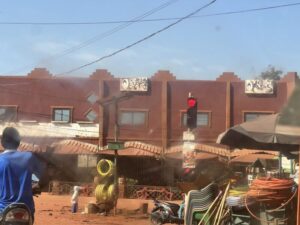As communities in Ilorin prepare for the impeding flood as predicted by several government agencies, concerns have arisen regarding the utilisation of the N1.1 billion ecological funds accrued to Kwara State between 2021 and 2023 DARE AKOGUN reports that utilisation of this fund has been shrouded in secrecy.
Like last year, the Nigeria Meteorological Agency (NiMET) issued a grim forecast for 2023
“2023 will witness an early onset of rainfall accompanied by flooding”, the agency said in its forecast published in January this year.
According to details of the Federation Account Allocation Committee (FAAC) (January 2023 Disbursement) published by the National Bureau of Statistics (NBS), 36 states of the federation and 774 local government councils received a total of N8.4 billion as ecological funds in January 2023. While states got N4.6 billion, local governments received N3.8 billion.
The funds were received by states and local governments despite their inability to justify over N64.417 billion given to them between 2021 and 2022. In all, the NBS data shows that states have received N69 billion as ecological funds between 2021 and January 2023, of this figure, a total of N1,156,671,187 has accrued to Kwara State. The state had received N1.048 billion as ecological funds between 2021 and 2022 before the fresh 108 million disbursed in January 2023.
Concerns have however been raised over the utilisation of the ecological funds in Kwara State, and investigations reveal that the project is shrouded in secrecy.
The Ecology Project Office, domiciled under the presidency has come under scrutiny for its inability to account for a staggering sum of N1.1 billion allocated for ecology projects in Kwara State despite repeated attempts by Sobi FM to shed light on the matter.
The only ecological project being undertaken in the state, according to environment ministry officials, is the dredging and embarkment work at the Asa River.
The Nigerian Meteorological Agency (NiMET) recently expressed concerns that its forecasts on flooding were ignored by most state governments, including the most vulnerable ones across the country. Consequently, citizens and businesses were made to face devastating floods. Many of the affected communities are still yet to recover from the impacts of the event.
Reports from the federal authorities showed that the 2022 floods resulted in 662 deaths across 33 states as the deluge of rain washed away years of investments in agriculture, hundreds of hectares of farmlands, and properties estimated at billions of naira.
In the same year, the National Emergency Management Agency (NEMA) estimated that over two million Nigerians were displaced and that the national economy lost a whopping N4.2 trillion to the floods. Over 569,000 hectares of farmland were destroyed.
For the people of Abata Jagun Community, Ifesowopo, Okelele in Ilorin East LGA, environmental degradation has always been a major source of concern, as they have faced serious erosion problems for more than twenty years.
Chairman of Abata Jagun Community, Mallam Solihu Ariyo, while speaking to our reporter decried the degree of devastation the erosion has caused to the environment, saying that the development has hindered social and economic growth.
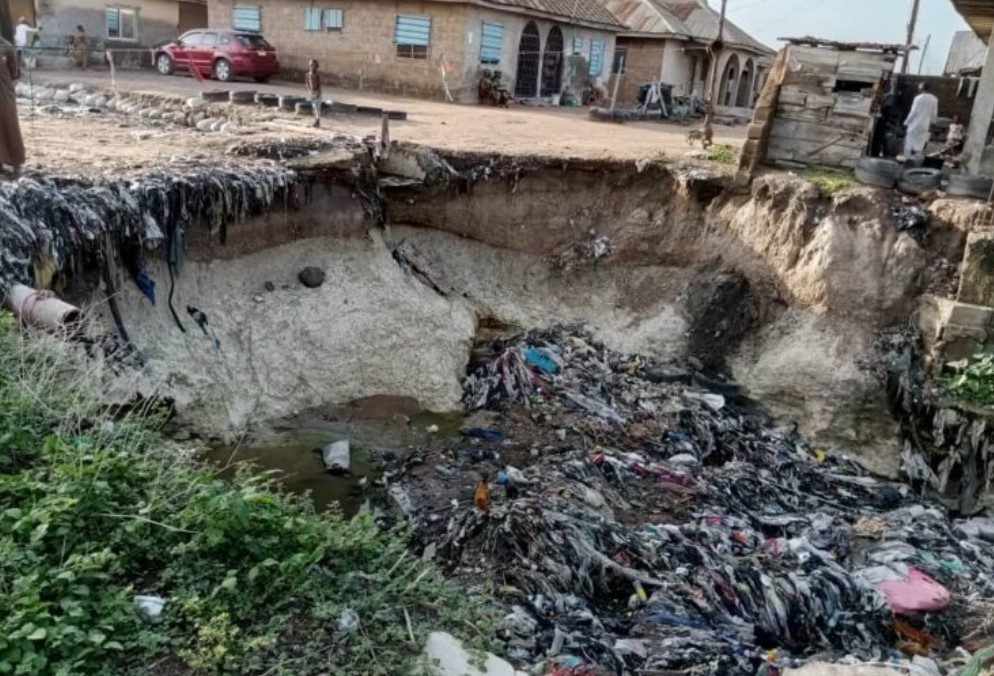
He revealed that the situation has forced many residents out of their various houses, while children have not been going to schools as the erosion has cut off the community from accessing other parts of the Ilorin metropolis.
According to him “This erosion problem in our community has become a source of worry and serious concern to us as residents, as many people have been rendered homeless, with landlords turning to tenants.
“Those of us that are still residing in the community at the mercy of God, we could not sleep with our eyes closed especially any time it rains,” he lamented.
Another community leader, Alhaji Yahaya Cisse, maintained that several efforts by the community to lobby the previous administrations in the state to come to their aid proved abortive.
Cisse, however, called on both national and subnational governments to assist in channeling and dredging of the river in the community.
In Akorede community in Ilorin South Local Government Area, Kwara State, is currently facing a significant environmental challenge as the community grapples with a massive gully erosion that poses a severe threat to local households.
The gully erosion, which has been gradually worsening over the years, has caused significant damage to the landscape surrounding Akorede Community.
When our reporter visited the area, he observed that the effects of the gully had manifested in some residential buildings with cracks in the walls.
Several houses are now precariously close to the expanding ravine, putting the lives and properties of residents at risk.
The Erosion has also almost chopped off the only access road serving the community, thus posing a danger to the residents and commuters plying the road.
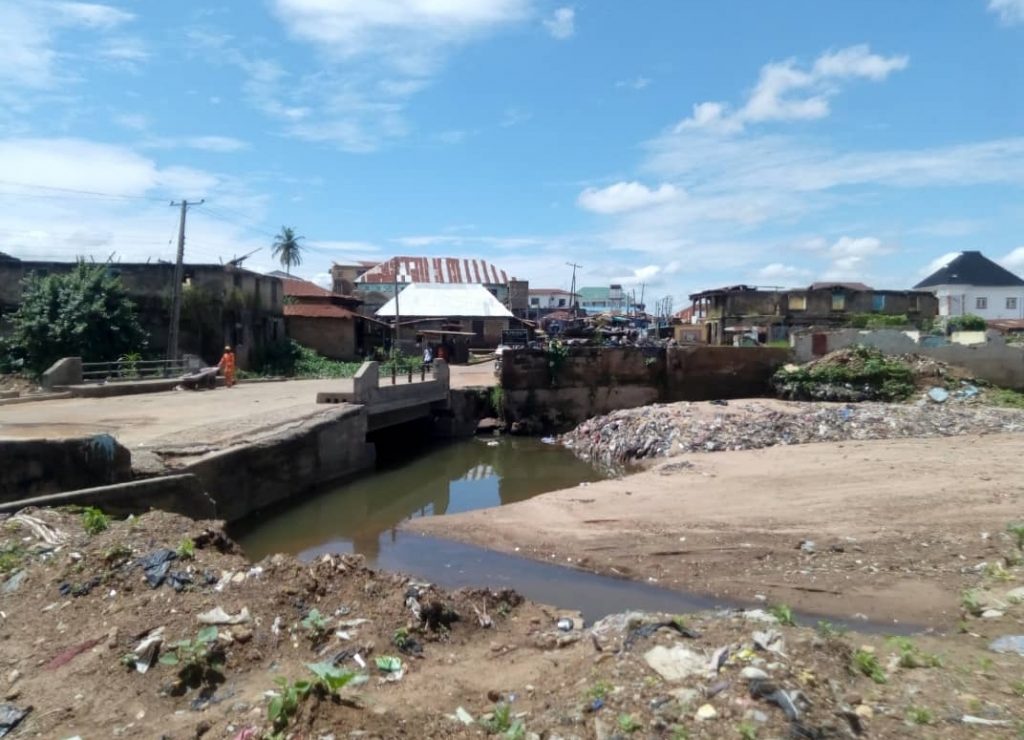
Local community leader, Mr. Adeolu Adebayo, expressed his disappointment, stating, “The erosion continues to expand, and our homes are at risk of collapsing. We need urgent action before it’s too late.”
He explained that the thought of rain is a nightmare for members of the community, saying “When it rains, houses, roads and other valuables will be overwhelmed with water.
“Some residents will have to vacate their houses because of the damage the flood could cause to their lives and property”.
The owner of one of the affected houses Ayodeji Abubakar, said there is no peace of mind in the community during the rainy season.
” There are some sets of houses that the erosion had done so much harm to. The gully has crept totally to the residential apartments, forcing them to enter their apartments through the backyards”.
“When we moved into my house about three years ago, the gully was not as much as it is now,” he added.
Abubakar recalled that the spaces that the gully had eaten up now used to be pathways for both cars and pedestrians, adding that the erosion had totally washed away the pathways.
He revealed that he spent a huge amount of money to make concrete walls and drainage to save his building while the erosion had not ceased creeping in.
Abubakar said that erosion control and management is one of the ways the government can protect the lives and property of the residents of the community, pleading with the government to construct drainages and fix their roads to avert looming disasters in the community.
Also speaking, another landlord whose residential building had been affected by the erosion, Mr. Fashola David, said he used concrete to build a water channel in front of his house to divert a drain that would have gotten into his house.
The Abata-Suban area of Ita-Kudimoh in Ilorin West is another community where erosion has displaced many residents, while several buildings and properties were also affected.
Kwara Government Committed to Preventing Flood, Erosion – Perm Sec
Speaking with our reporter on behalf of the Permanent Secretary Ministry of Environment Kwara State, the Head of Ecology and Conservation Unit, Directorate of Environment, Mr. Ilyas Abdulganiyu, said that the Ecological Project Office is responsible for carrying out ecological projects in any state of the federation.
He, however, stated that the only ongoing ecological project in the state is the dredging and construction of the embankment of the Asa River in the state capital within a clear scope spanning some areas of the river.
According to him “I am not aware of money released to the state, but there are areas prone to ecology problems in the state. In Ilorin, it’s the Asa River that extends from Asa Dam Road down to Harmony Bridge.
“The one they are doing now is from Unity bridge to Harmony bridge, which is the second phase, the first phase was from Unity to Amilegbe which they have completed with concrete embankment,” he said.

He revealed that the only involvement of the ministry is in the area of supervision of the project and nothing more.
“The ministry was informed when the flag was to be done and we were there, so everything about the project is handled by the ecology project office,” he said.
Apart from this project details of other project being executed in the state was shrouded in secrecy as no available information about the project was available.
Abdulganiyu, however, revealed that the state government on its part is carrying out the desilting of drainages and clearing of debris in small rivers and waterways in the Ilorin metropolis as part of its efforts at complementing the work being carried out by the federal government.
“These new areas are Ojatuntun to Ita Amodu and Stadium to Unity Bridge.
“Two separate jobs are being embarked upon at different sections of the large River to arrive at the same solution of preventing flooding and protecting lives and properties,” he said.
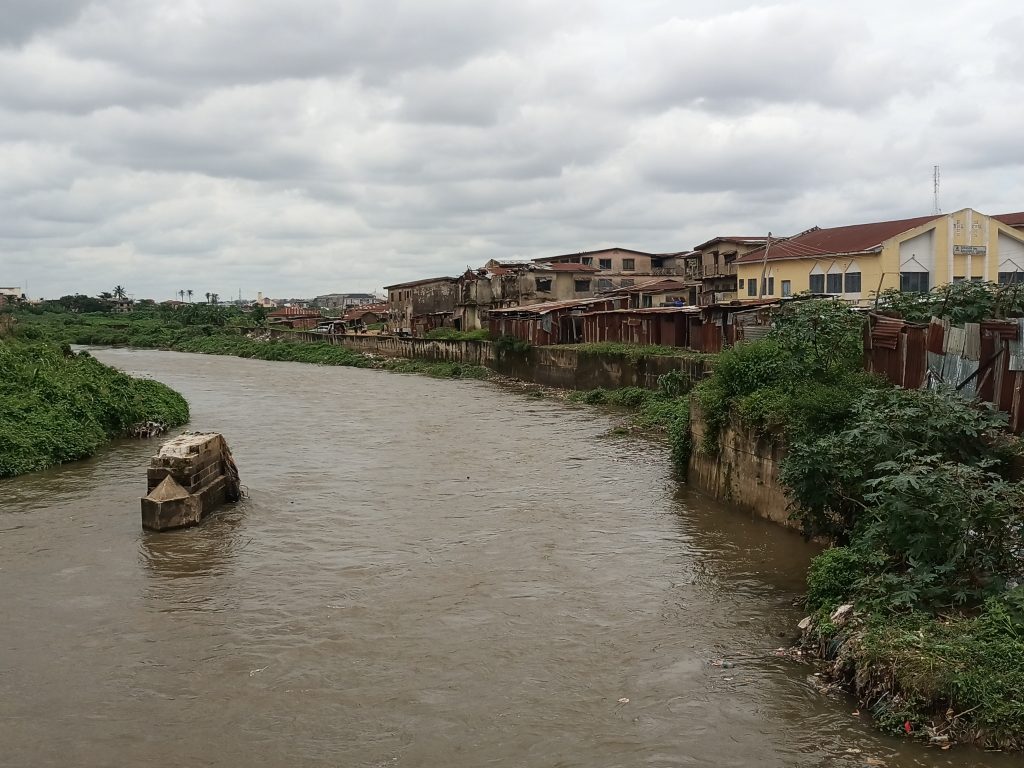
When our reporter the sites of the project mentioned, it was observed that dredging and embankment were carried out at the unity and post office area of the river, while only dredging was noticed at the Amilegbe axis of the river.
According to the signboard at the site the contract was awarded to EUROBEL International LTD FCT, Abuja, the consultant was Angle Light Resource Limited also in the FCT, while the client is the Ecological Project Office.
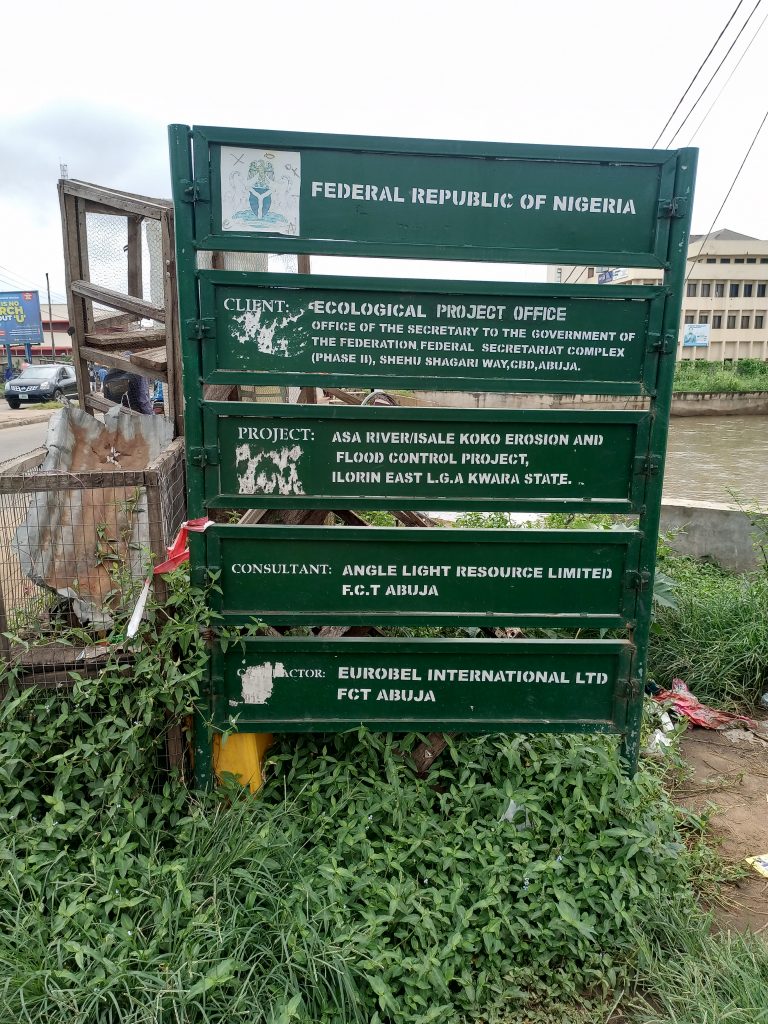
Ecological Office Declines Multiple FOI Requests About Project Sites in Kwara State.
With ecological problems ravaging many communities in the state, concerns have been raised over how the Ecological Funds Office has spent the N1.1 billion meant to address exactly this problem.
Investigations into the matter revealed a lack of transparency and accountability in the Ecology Project Office. Multiple requests for information regarding the specific projects undertaken with the allocated funds have been met with silence, leaving citizens and stakeholders in the dark about the progress or completion of the ecology initiatives.
A FOI request was first sent through the International Centre for Investigative Reporting, ICIR, on May 30 to the Ecological Funds office requesting for the details of projects executed in the state, including contract description, approved threshold, procurement methods, date of opening bids, and other details. The request was ignored.
A second request was sent on June 26th to the Ecology Project Office but no response till date.
The requests were pursuant to Section 2 (3) and 4 of the Freedom of Information Act 2011, specifically requested for a detailed response on the following;
“The Ecology Project Office total budget for the ecological projects in Kwara state between 2021 and 2022. The total released sum for the Ecological project in Kwara state between 2021 and 2022. The Contract descriptions of ecological projects in Kwara between 2021 and 2022. Dates the projects were advertised in the media, the approved threshold, procurement method, date of bid opening, name of the contractor, date of contract award, contract value, approved budgetary provisions, the amount paid to the contractor so far, and level project completion.
However, in February 2023 the then Permanent Secretary, of the Ecological Project Office, Shehu Ibrahim, threatened to sanction contractors who failed to meet up with their contractual agreements and timelines for the completion of their Projects.
Ibrahim said this during an on-the-spot inspection tour of projects in Kwara and Lagos states. Sites visited were Asa River/Isale Koko Erosion and Flood Control Project, Ilorin, Kwara State, where he said that the projects are time-bound because of the seasonal flooding experienced in the country annually.
Speaking at the site of the 4 km Asa River/Isale Koko project and disclosed that over 20 years of the history of flooding in the area has come to an end with the ecological intervention of the Federal Government through the Ecology Project Office.
According to him, “We are happy that the problems have reduced in the last two to three years when the Federal Government put up measures of erosion and flood control through the project,” adding that the project is positioned to handle the threats posed by the river and its offshoots, causing untold hardship to residents every year.
The major works to be executed under the contract involve dredging and desilting, as well as channelisation and construction of retaining walls and drainage channels.
“After the evacuation, desilting, and dredging of the river, people were still dumping refuse in the river. This is something we need to do with the State Government in order to stop the act of dumping refuse in the river and to achieve our goal,” he said.
Malam Ibrahim appealed to residents to maintain the projects so that they can stand the test of time and also admonished them to avoid indecent dumping of debris on the canals which escalates flooding. In addition, he said that the dumped debris will block the waterways, and narrow the river path which prevents the free flow of water from the rivers during the rainy season.
Growing trends of misuse and misappropriation of funds from EPO.
In 1981, the Nigerian Government created the Ecological Project Office (EPO) to address environmental concerns such as erosion, flooding, and landslides amongst other natural or man-made disasters that put human lives and properties at risk across the country.
The EPO receives two percent of Nigeria’s total fiscal budget yearly and does not disclose its annual budget publicly. This is in clear violation of the provision of the Fiscal Responsibility Act, FRA, of 2007, which mandates government agencies to make their budget public.
However, over the past years, there has been a growing trend of misuse and misappropriation of funds from EPO.
An ICIR report shows that projects approved and funded by the Ecological Fund Office from the year 2005 to 2015 were either abandoned, poorly executed, or not done at all.
Within this period, 25 projects approved and funded by EPO in the North Central states of Niger, Nassarawa, Benue, Plateau, Kwara, Kogi, and the Federal Capital Territory (FCT), Abuja, cost a total sum of ₦3.7 billion.
It was observed that some of these projects were approved for purposes not relevant to the aims and objectives of the fund.
For example, money was approved by the Federal government on March 4, 2003, through the Ecological Fund account of the Secretary to the Government of the Federation (SGF) for the construction of an abattoir in Bida, Niger State with Lower Niger River Basin Development Authority (LNRBA) as the executing agency.
Also, an audit report by NEITI revealed among others, how the Federal Government led by Goodluck Jonathan, and then Muhammadu Buhari, diverted N93.7 billion meant for the Derivation and Ecology Fund.
Since September 2013, the Nigerian Government has been receiving support from the World Bank to reduce vulnerability to soil erosion, while also carrying out remedial measures in erosion-affected states under the eight-year, $500-million Nigeria Erosion and Watershed Management Project (NEW MAP).
However, these efforts have not reached residents of the community who still long for the government’s intervention.
‘House Probe in 2022’
Irked by the lack of accountability which has dogged the management of these funds at almost all tiers of government, the House of Representatives in June 2022, mandated its Committee on Environment to investigate remittances to the Ecological Fund and withdrawals from the account between 2010 and 2022, alleging mismanagement by the beneficiaries.
Specifically, the House mandated the committee to, among other things, “investigate the total consolidated mandatory accruals into the Ecological Fund from 2010 to March 2022,” adding that the committee should equally “evaluate the disbursement of the Ecological Fund in line with the provision of the 1999 Constitution from 2010 to March 2022.”
The committee is also to “investigate the utilisation of the Ecological Fund by benefiting government’s departments and agencies (MDAs) from 2010 to March 2022 and establish infractions (if any).”
To establish these facts, the House asked the committee to conduct public hearings with all the major stakeholders on the effective and efficient utilisation of the Ecological Fund and report back within six weeks for further legislative action.
The House resolution to probe was a sequel to a motion moved by a member of the House, Femi Bamisile, titled ‘Need to Investigate the Total Consolidation Accrual and Utilisation of Ecological Fund.’
Bamisile had while moving the motion, noted the existence of the Ecological Fund as an intervention fund set up by the Federal Government to address multifarious ecological challenges across the country.
He also noted that the Federal Government, the 36 states of the federation, the 774 local government areas, and the Federal Capital Territory, FCT, receive funds through the Federal Allocation Committee as shares from the Ecological Fund.
The lawmaker stressed that apart from the annual statutory appropriations, four agencies of the Federal Government draw funds from the one percent share of the Federal Government allocated to Ecology and Derivation Fund, according to their respective enabling laws.
Bamisile stressed that the National Emergency Management Agency, by virtue of Section 13(2) (b) of its Act, draws 20 percent; National Agency for the Great Green Wall, by virtue of Section 12 (2) (b) of its Act, draws 15 percent; the North East Development Commission, by virtue of Section 14(12) (b) of its Act, draws 10 percent; and the National Agricultural Land Development Authority, by virtue of Section 18 (2) (a) of its Act, draws 10 percent.
“The House is worried that efforts at making beneficiaries of the Ecological Fund accountable for their accrued shared funds in the last few years have been ignored.
“Sections 88 and 89 Constitution of the Federal Republic of Nigeria, 1999 (as amended) empowers the National Assembly to conduct investigation and power as to matters of evidence,” Bamisile said.
‘Experts React’
Environmental organisations and concerned citizens have expressed their disappointment at the office’s failure to provide a detailed breakdown of the funds’ utilisation.
According to them the refusal to respond to the FOI letter only deepens suspicions of mismanagement and possible embezzlement, as the absence of transparency raises questions about the integrity of the ecological projects in Kwara State.
They warn that failure to utilise the funds as intended could have devastating consequences on the people and the environment in the long run.
The Executive Director of Waterwide Nigeria, Mr. Wilson Atumeyi, said while ecological funds played a critical role in ecological issues, there were still issues of mismanagement and misuse.
“Ecological funds are significant for the country, but we have mismanagement issues around them. Within the same period of 2021 and 2022, we have had serious ecological problems like flooding, and you wonder where N64 billion went because the impact of such huge money was not felt.”
He argued that the lack of accountability not only undermines public trust but also hampers the state’s ability to effectively address environmental challenges. The mismanagement of such a substantial amount of public funds intended for ecological projects further exacerbates the existing environmental issues in Kwara State, which include deforestation, soil erosion, and water pollution.
“It is high time citizens began to ask relevant government agencies how they spend their share of the Ecological Fund”, he said.
The Global Director of Brain Builders Youth Development Initiative with climate volunteers across all LGAs in Kwara Olasupo Abideen expressed concern about the situation.
He said the scale of the problem demands immediate and sustained action from the appropriate authorities.
According to him “These natural disasters disrupt lives, destroy properties, and threaten the livelihoods of countless people. Despite the allocation of substantial ecological funds, the situation on the ground shows that more needs to be done to effectively mitigate and address these issues.
“A few weeks ago, we visited some selected communities in Kwara state to spotlight the challenges they are facing. The stories we encountered were heart-wrenching, highlighting the urgency of the situation.
“While the ecological funds present an opportunity for addressing these environmental challenges, it is imperative that the funds are utilised effectively and transparently.
“The appropriate authorities must be held accountable for the allocation and disbursement of these funds to ensure that they reach the communities in need and are utilised for sustainable and impactful projects,” he said.
He however called on the Kwara state government and relevant federal agencies to take immediate action to address the plight of these communities.
“The situation requires a comprehensive and sustainable approach that includes investments in flood control infrastructure, erosion management, and climate-resilient measures.
I urge the authorities to be transparent in their allocation and utilisation of ecological funds. It is essential to involve civil society organisations and community representatives,” he said.
Calls for a thorough investigation into the utilisation of the ecology fund have intensified, with demands for those responsible for the mismanagement, if any, to be held accountable. Transparency and accountability in the handling of public funds are crucial for sustainable development and the preservation of the environment.



